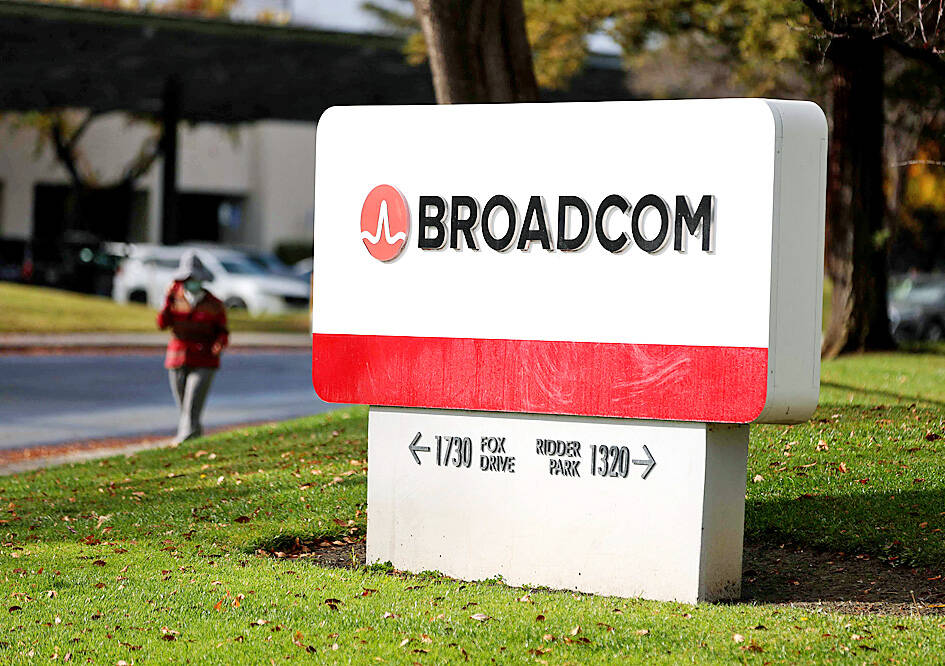Broadcom Inc has had informal talks with its advisers about making a bid for Intel Corp’s chip-design and marketing business, the Wall Street Journal reported, citing people familiar with the matter.
Nothing has been submitted to Intel and Broadcom could decide not to pursue a deal, according to the Journal.
Bloomberg News earlier reported that Taiwan Semiconductor Manufacturing Co (TSMC, 台積電) is in early talks for a controlling stake in Intel’s factories at the request of officials at US President Donald Trump’s administration, as the president looks to boost US manufacturing and maintain the country’s leadership in critical technologies.

Photo: AFP
Trump officials raised the idea of a deal between the two companies in recent meetings with the Taiwanese chipmaker, a person familiar with the matter said, and TSMC was receptive. It is unclear whether Intel is open to a transaction.
The talks are in early stages, and the exact structure of a potential partnership has not been established, but the intended result would have the world’s largest made-to-order chipmaker fully operating Intel’s US semiconductor factories, the person said.
It also would address concerns about Intel’s deteriorating financial state, which has forced the company to slash jobs and curb its global expansion plans.
The arrangement might involve having major US chip designers take equity stakes, along with support from the US government, the person said.
That means the venture would not solely be owned by a foreign company. TSMC is the go-to chipmaker for Apple Inc, Nvidia Corp and other companies developing semiconductors that power artificial intelligence algorithms.
Still, the possible partnership could run into political hurdles, not unlike those that have hamstrung a proposed acquisition of United States Steel Corp by Japanese maker Nippon Steel Corp.
A White House official said that the president is unlikely to support a foreign entity operating Intel’s factories.
The White House official said the Trump administration supports foreign companies investing and building in the US, but is “unlikely” to support a foreign firm operating Intel’s factories.
Broadcom and TSMC are not working together and all talks so far are preliminary and largely informal, the Journal reported.
Intel interim executive chairman Frank Yeary has been leading the discussions with possible suitors and Trump administration officials, who are concerned about the fate of a company seen as critical to national security, the report said.
Yeary has been telling individuals close to him that he is most focused on maximizing value for Intel shareholders, the report added.
Intel, Broadcom, TSMC and the White House did not immediately respond to requests for comment.
Additional reporting by Reuters

TAKING STOCK: A Taiwanese cookware firm in Vietnam urged customers to assess inventory or place orders early so shipments can reach the US while tariffs are paused Taiwanese businesses in Vietnam are exploring alternatives after the White House imposed a 46 percent import duty on Vietnamese goods, following US President Donald Trump’s announcement of “reciprocal” tariffs on the US’ trading partners. Lo Shih-liang (羅世良), chairman of Brico Industry Co (裕茂工業), a Taiwanese company that manufactures cast iron cookware and stove components in Vietnam, said that more than 40 percent of his business was tied to the US market, describing the constant US policy shifts as an emotional roller coaster. “I work during the day and stay up all night watching the news. I’ve been following US news until 3am

UNCERTAINTY: Innolux activated a stringent supply chain management mechanism, as it did during the COVID-19 pandemic, to ensure optimal inventory levels for customers Flat-panel display makers AUO Corp (友達) and Innolux Corp (群創) yesterday said that about 12 to 20 percent of their display business is at risk of potential US tariffs and that they would relocate production or shipment destinations to mitigate the levies’ effects. US tariffs would have a direct impact of US$200 million on AUO’s revenue, company chairman Paul Peng (彭雙浪) told reporters on the sidelines of the Touch Taiwan trade show in Taipei yesterday. That would make up about 12 percent of the company’s overall revenue. To cope with the tariff uncertainty, AUO plans to allocate its production to manufacturing facilities in

Six years ago, LVMH’s billionaire CEO Bernard Arnault and US President Donald Trump cut the blue ribbon on a factory in rural Texas that would make designer handbags for Louis Vuitton, one of the world’s best-known luxury brands. However, since the high-profile opening, the factory has faced a host of problems limiting production, 11 former Louis Vuitton employees said. The site has consistently ranked among the worst-performing for Louis Vuitton globally, “significantly” underperforming other facilities, said three former Louis Vuitton workers and a senior industry source, who cited internal rankings shared with staff. The plant’s problems — which have not

COLLABORATION: Given Taiwan’s key position in global supply chains, the US firm is discussing strategies with local partners and clients to deal with global uncertainties Advanced Micro Devices Inc (AMD) yesterday said it is meeting with local ecosystem partners, including Taiwan Semiconductor Manufacturing Co (TSMC, 台積電), to discuss strategies, including long-term manufacturing, to navigate uncertainties such as US tariffs, as Taiwan occupies an important position in global supply chains. AMD chief executive officer Lisa Su (蘇姿丰) told reporters that Taiwan is an important part of the chip designer’s ecosystem and she is discussing with partners and customers in Taiwan to forge strong collaborations on different areas during this critical period. AMD has just become the first artificial-intelligence (AI) server chip customer of TSMC to utilize its advanced